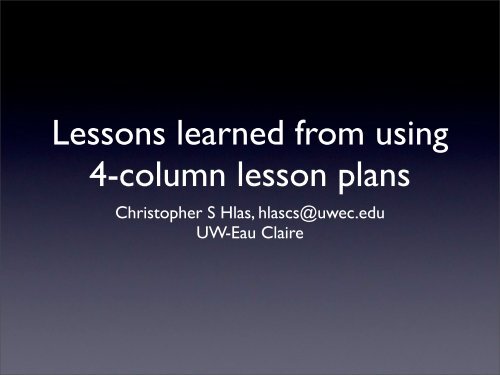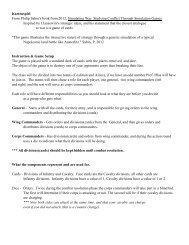Lessons learned from using 4-column lesson planning with ...
Lessons learned from using 4-column lesson planning with ...
Lessons learned from using 4-column lesson planning with ...
You also want an ePaper? Increase the reach of your titles
YUMPU automatically turns print PDFs into web optimized ePapers that Google loves.
<strong>Lessons</strong> <strong>learned</strong> <strong>from</strong> <strong>using</strong><br />
4-<strong>column</strong> <strong>lesson</strong> plans<br />
Christopher S Hlas, hlascs@uwec.edu<br />
UW-Eau Claire
Overview<br />
Two apologies<br />
What is Lesson Study?<br />
What is 4-<strong>column</strong> <strong>lesson</strong> plan?<br />
2+1 experiments<br />
Future
Teaching Gap (1999)<br />
TIMSS video study: USA, Germany, Japan<br />
Teaching is a cultural activity<br />
Lesson Study is PD model in Japan
Lesson study model<br />
Research<br />
Reflect<br />
Plan <strong>lesson</strong><br />
Present <strong>lesson</strong>
4-<strong>column</strong> Lesson Plan<br />
Key <strong>lesson</strong><br />
features<br />
Title & math<br />
content<br />
Grade level,<br />
standards<br />
Teacher names<br />
Objectives Materials References<br />
Time length,<br />
assumed<br />
knowledge<br />
Steps of <strong>lesson</strong>:<br />
Learning<br />
activities & Key<br />
questions<br />
Expected student<br />
reactions /<br />
responses<br />
Teacher’s<br />
response to<br />
students / Things<br />
to remember<br />
Goals & Methods<br />
of evaluation<br />
.<br />
.<br />
.<br />
.<br />
.<br />
.<br />
.<br />
.<br />
.<br />
.<br />
.<br />
.
Background #1<br />
Colleague’s preservice math methods/<br />
practicum at research university (N=23), circa<br />
2003<br />
Three mini-<strong>lesson</strong> study "cycles":<br />
1. GSP in pairs (5 weeks)<br />
2. PS <strong>using</strong> reform texts, 4-5 in group (2 weeks)<br />
3. Two related, non-trivial problems in random<br />
pairs (3 weeks)
Survey questions (n=13)<br />
1. Strongest experience <strong>with</strong> 4c-LP<br />
2. Which <strong>column</strong>s most helpful? Why?<br />
3. Which <strong>column</strong>s least helpful? Why?<br />
4. Predict student differences between <strong>using</strong><br />
4c-LP vs traditional LP<br />
5. What hindsights for further developing 4c-<br />
LP?
[2nd <strong>column</strong>] difficult, but worthwhile, it really gets you<br />
thinking <strong>from</strong> the student's point of view.
The teacher will be more concerned w/ the student<br />
understanding of the <strong>lesson</strong> w/ the 4 <strong>column</strong> plan than<br />
finishing everything in the objective.
When I taught <strong>lesson</strong>s in class it really helped me to think<br />
out the whole <strong>lesson</strong>.
More comfortable <strong>with</strong> the entire <strong>lesson</strong>.
Very time consuming.
I find the 4-<strong>column</strong> plan clumsy and bothersome. I would<br />
only use it if I had to.
Take aways...<br />
• Focus on student thinking<br />
• Student thinking is difficult to predict<br />
• Well prepared<br />
• Recommended for daily <strong>planning</strong>?
Background #2<br />
• My preservice methods at teaching<br />
university, circa 2008<br />
• Four groups, 3-4 per group<br />
• Research portion<br />
• Lesson 1, revision, Lesson 2 week later,<br />
reflection
4-<strong>column</strong> revisited<br />
Learning<br />
activities & Key<br />
questions<br />
Anticipated<br />
student<br />
responses,<br />
questions &<br />
misconceptions<br />
Teacher’s<br />
support (followup<br />
questions/<br />
actions)<br />
Goals and<br />
methods for<br />
evaluation<br />
Dropped<br />
"steps of<br />
<strong>lesson</strong>"<br />
More specific Same Same
Anecdotal observations<br />
• Teachers didn’t understand <strong>column</strong>s 2-4<br />
• Students say “Okay”, "Can we eat<br />
candy?"<br />
• "Nodding" for informal assessments<br />
• More scaffolding needed for 4c-LP (possibly<br />
adapt existing or create for video <strong>lesson</strong>?)
Conclusions?<br />
“A single <strong>lesson</strong> contains many (if not all) of the<br />
critical components that teachers must<br />
consider to improve instruction”<br />
Sims, 2009, pg. 725
Q/A?<br />
• Matthews, M., Hlas, C.S., &Finken, T. (2009 March). <br />
Using four-‐<strong>column</strong> <strong>lesson</strong> <strong>planning</strong> and Lesson Study <br />
<strong>with</strong> pre-‐service teachers. Mathematics Teacher, 102, <br />
504-‐508.<br />
• Lewis, C. (2002). Lesson Study: A Handbook of Teacher-‐<br />
Led Instructional Improvement. Philadelphia: Research <br />
for Better Schools.<br />
• Sims, L. & Walsh, D. (2009). Lesson study <strong>with</strong> preservice <br />
teachers: <strong>Lessons</strong> <strong>from</strong> <strong>lesson</strong>s. Teaching and Teacher <br />
Education, 25, 724-‐733.<br />
• Stiger, J.W. & Hiebert, J. (1999). The teaching gap: Best <br />
ideas <strong>from</strong> the world's teachers for improving education <br />
in the classroom. New York: Free Press
Experiment 3<br />
• Inservice teachers<br />
• 2nd year of 3 year grant on Lesson Study<br />
• Practicing teachers K-12, well balanced
4-<strong>column</strong> Lesson Plan<br />
Learning activities /<br />
Key questions (<strong>with</strong><br />
timing)<br />
Expected student<br />
responses, questions<br />
misconceptions,<br />
Teacher’s support<br />
(follow-up<br />
questions/actions)<br />
Formative<br />
assessments<br />
Added timing Same Same<br />
Teacher<br />
specific
Observations<br />
• Last <strong>column</strong> conf<strong>using</strong>, more nodding<br />
• Great for observation
4-<strong>column</strong> Lesson Plan,<br />
planned<br />
Learning activities<br />
or Key questions<br />
(<strong>with</strong> timing)<br />
Expected student<br />
responses,<br />
questions, &<br />
misconceptions<br />
Teacher’s support<br />
(follow-up<br />
questions/actions)<br />
Objectives &<br />
Desired evidence<br />
(observation notes)<br />
Same<br />
Same<br />
Possibly<br />
scaffolding?<br />
Use for<br />
observation<br />
and data
More on LS grant<br />
http://people.uwec.edu/hlascs/mctls



